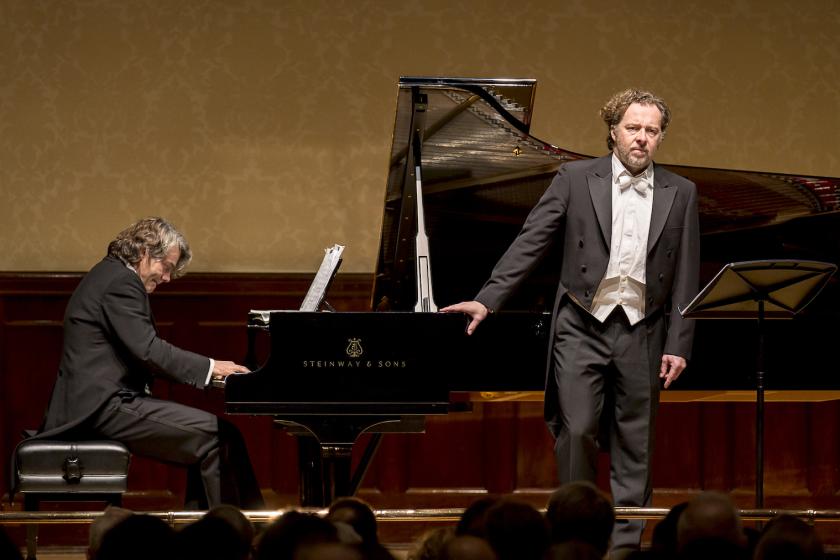As Wigmore Hall audiences really ought to know, silence can be golden. Especially at the close of Schubert’s Winterreise, as the uncanny drone-like fifths of the hurdy-gurdy in “Der Leiermann” fade away into – well, whatever state of mind the singer and pianist have together managed to communicate over the preceding 24 songs. So much remains ambiguous – and open to plausible re-interpretation – in this cycle that the traditional pause for reflection as it ends makes good sense. Last night, however, the star (even, perhaps, cult) status of the German Lieder virtuoso Christian Gerhaher triggered an instant ovation that rudely shattered Schubert’s frozen spell.
Accompanied as ever by his long-term shadow and soulmate Gerold Huber, the Bavarian baritone sang with the controlled elegance and flawless taste that we expect. Perhaps this beautifully shaped Winterreise lacked just a touch of the elusive soul that more audacious, even wilful, renderings can bring to it. How pernickety, though, to quibble with artistry of this calibre. But Schubert does sometimes guide you into trackless wastes where taste, or even technique, alone can never quite suffice. Gerhaher and Huber lack almost nothing in their lifelong devotion to this music – except, maybe, the eccentricity to take them to its very darkest places.
That said, the duo have set a benchmark for achievement in this work that only the most foolhardy – or inspired – of performers would ever want to spurn. Warm, confiding, even conversational, surely more sad than mad, Gerhaher’s characterisation of the lovelorn wanderer who sings these songs has a dramatic intimacy that always appeals – even if his voice, sometimes surprisingly light in its colours, seldom matches the deep sheen and glow of a few illustrious forerunners (Fischer-Dieskau, Hotter and Quasthoff, perhaps). A truly outstanding accompanist, Huber meanwhile sketches the inner and outer landscapes woven into the music behind the words – from memories of spring flowers to rushing streams, frozen branches and falling leaves – with unerring tact and finesse. Both intellectual and intuitive, the pair shape a robust framework to hold and drive the feeling of each song.
We began almost serenely with a “Gute Nacht” suggesting that separation from the beloved and a solitary winter journey might be a worthwhile, even exciting, adventure. Only in the third stanza did Gerhaher’s anxious crescendo hint at the torments to come. By the second number, “Die Wetterfahne”, he was deploying those sudden dynamic shifts and volcanic fortissimos that trademarked the rest of the cycle. Arguably, Gerhaher overuses these shocking blasts of sound to underline the crises along the vagabond’s path – but there’s no denying their blood-chilling impact. The wanderer’s “heisse Weh” (burning anguish) in “Wasserflut” was ignited by some truly scary vocal dynamite. Gerhaher (pictured below by Alexander Basta) can also win our confidence with the gentler lyricism he showed in a lovely “Der Lindenbaum” or the beguiling touches of rubato amid the pianistic ripples and eddies of “Auf dem Flusse”.
 In “Irrlicht”, the chase for a will-o’-the-wisp brought out Gerhaher’s ability to mould individual lines so that, within a couple of phrases, the voice can lead you from the heights of hope to the depths of grief and back again. If “Rast” concluded with one of the most thunderous and threatening of the singer’s signature fortissimo outbursts, we then slipped straight into a charming “Frühlingstraum” in which Huber summoned his gorgeously bucolic memories of spring. The pair don’t attempt to impose any narrow narrative path on the music, preferring instead to treat each number as a self-standing drama in itself.
In “Irrlicht”, the chase for a will-o’-the-wisp brought out Gerhaher’s ability to mould individual lines so that, within a couple of phrases, the voice can lead you from the heights of hope to the depths of grief and back again. If “Rast” concluded with one of the most thunderous and threatening of the singer’s signature fortissimo outbursts, we then slipped straight into a charming “Frühlingstraum” in which Huber summoned his gorgeously bucolic memories of spring. The pair don’t attempt to impose any narrow narrative path on the music, preferring instead to treat each number as a self-standing drama in itself.
This gives them a spread of options in the second dozen of the 24 poems by Wilhelm Müller that the dying Schubert set in 1827. Here, the thematic trail of the “journey” grows much fainter. The singer paces around the darker corners of the soul rather than trekking picturesquely across ice and snow. Huber still had plenty of opportunity for deftly phrased mimetic passages: the distant post-horn in “Die Post”, the eerie squawk of the crow in “Die Krähe”, or – supremely – the modernistic, percussive falling leaves of “Letzte Hoffnung”. Gerhaher, for his part, seemed to expand his emotional range: stricken with almost operatic solitude in “Einsamkeit”; genial but terrified at the length he still must march towards the longed-for grave in “Der greise Kopf”; finding the macabre humour of a medieval ballad in the ominous fellow-travelling bird of “Die Krähe”.
Too scrupulous a singer to endorse any single-track interpretation, Gerhaher relished the contrasts of these final songs rather than moulding them into a straightforward journey towards the grave – or the asylum. He embraced the mood of heroic ruggedness in “Der stürmische Morgen” as well as the utter desolation that rounds off “Der Wegweiser”, with its dire invocation of the road ahead “from which no man has ever returned”. “Das Wirtshaus”, with the hymn-like cadences of the piano part and the Bachian resignation and fortitude of its vocal line, showed the partnership at its impeccable best. After which, the slow, unearthly “Der Leiermann” felt oddly, or maybe deliberately, inconclusive – a muffled signpost towards a future of last-ditch survival rather than a gesture of mortal despair. Samuel Beckett loved Winterreise. And we left this formidable double-act in the bitter, bracing but not quite fatal climate of his dramatic world. For as long as the hurdy-gurdy cranks its tune, “I can’t go on, I’ll go on.”














Add comment